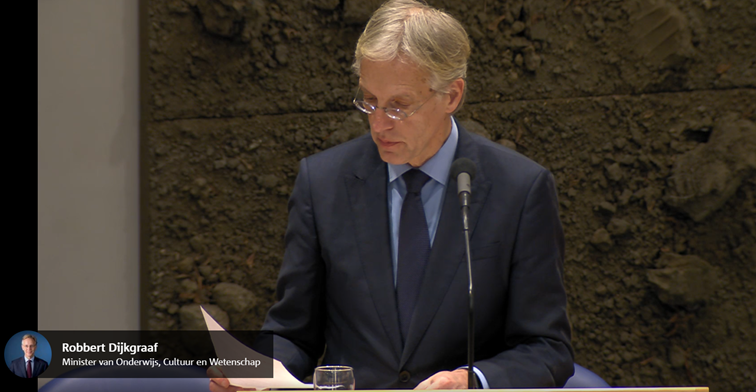Dutch Parliament discusses internationalisation
Stricter rules for English-taught programmes are on the way

Crowded lecture halls, not enough rooms for rent, problems with students' language proficiency... On Thursday (June 15), the Dutch Parliament discussed the issues surrounding internationalisation once again. When it comes to higher education, that is one of the most controversial topics in politics right now.
The scepticism was palpable in the debate with the Minister of Education, Robbert Dijkgraaf. "Nice to see that many of you have a tendency of seeing the glass half-empty," needled the minister. "Perhaps you're right. But I'm a born optimist. I've got the feeling that the package of measures we have now is basically complete."
Getting a grip
MPS delved into Dijkgraaf's plans to get a grip on the influx of foreign students. According to earlier announcements, the minister would like universities to be able to set a cap on the number of students allowed in the English tracks, in order to restrict the number of international students and guarantee that all Dutch students get a spot.
The laws surrounding the language of instruction are supposed to get stricter as well: programmes will be required to better justify why it's necessary to teach in languages other than Dutch. A committee is going to be set up to analyse requests for new English-taught Bachelor's degrees. Apparently, the current law is not working "because there is a huge gap in that regard," said the minister, in whose view there is currently too much room for exceptions. "And then everyone just swims through."
In other aspects, the law is actually getting more lenient. Dutch-taught programmes will have the possibility of teaching up to a third of their classes in other languages. Those programmes that would like to offer even more courses in other languages will have to justify the request.
Centralised control
Dijkgraaf was also asked to clarify his idea of "centralised control". It would basically be a way for higher education institutions to "steer things themselves", determining together how they to go about internationalising. They would be allowed to do so "within clear boundaries" set by the minister, who would be advised by the new committee. The minister would also be able to "pull the brakes" if need be.
The idea was met with some resistance. Harm Beertema, from the far-right party PVV, said there are already too many people in control in higher education, and they have all let internationalisation get out of hand. "All the council members, all the executive boards, all the education committees, all the participation bodies, all the exam committees, all visitation committees... Why would things be any better this time?"
But Dijkgraaf remains confident. He said educational institutions are well aware of the problem. "We're living in another era now. The cracks are showing. Many of you have pointed towards a few perverse incentives and the times have changed."
Elephant in the room
Financing seems to be the biggest of said incentives. The amount of money allocated to each institution is defined according to the number of students they have. It was in their best interest, therefore, to recruit as many international students as possible. So, what can be done about that now? The higher education budget is basically divided into two blocks: a fixed amount that institutions get anyway and a variable amount tied to the number of students each one has. Many parties suggested increasing the fixed part so that recruiting students becomes less important.
This is clearly a stone in the shoe of many political parties. It is the "elephant in the room" in the discussions about internationalisation, in the words of MP Lisa Westerveld, from the GroenLinks (Green Left, Ed.) party. Although financing is the biggest issue, no one wants to talk about it. It looks like Dijkgraaf isn't planning on starting to, either. He basically intends to leave the choices to the institutions themselves. He explained that tinkering with finances isn't as easy as it seems: although increasing the fixed amount would perhaps offer more security to higher education institutions, there are also disadvantages to doing so, especially for growing programmes.
Financially underwater
One could increase the fixed amount allocated to higher education but what about the rest? "I'm afraid that the Minister of Finance pays me according to the total number of students," says Dijkgraaf. That's why he warned against expanding the first financial block: the variable part would become even more variable.
"Institutions could even get financially underwater," he stresses. "We've got to approach costs in a really careful and holistic manner."
This summer, the minister intends to publish a draft bill about internationalisation online, allowing for anyone to comment on it. After that, he would like to get the law through the Parliament and the Senate as soon as possible. The law will cover control, numerous fixus, language requirements and so on. A discussion about financing is still going to have to wait.